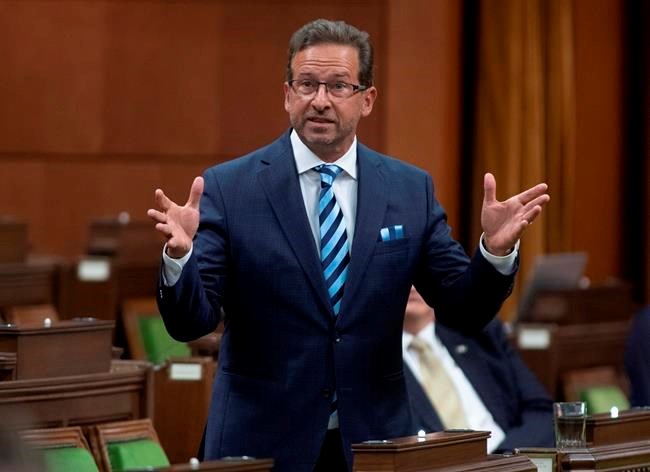OTTAWA — Bloc Quebecois Leader Yves-Francois Blanchet and almost his entire caucus went into self-isolation Monday after a member of his staff tested positive for COVID-19.
The test came back positive less than a week after Blanchet and most of his 31 MPs held an in-person caucus meeting.
And it came just as the Liberal government is in the midst of negotiations with opposition parties over how the House of Commons should function when Parliament resumes on Sept. 23.
The forced isolation of all Bloc MPs underscored the risk of having even a small number of MPs physically present in the chamber.
Bloc spokeswoman Carolane Landry said in a statement that everyone potentially affected by the staffer's positive test will be screened to ensure they're healthy and will follow public health guidelines.
In the meantime, she said all their work has been moved online.
The House of Commons has been largely suspended since mid-March, with only periodic, brief sittings to deal with emergency aid legislation to help Canadians weather the pandemic.
The government is now proposing that the chamber resume all its normal business as of Sept. 23, but in a hybrid format, with a small number of MPs sitting in the House and the rest participating virtually, including voting electronically.
Government House leader Pablo Rodriguez said Monday that "definitely the NDP and the Bloc are open" to the proposal.
"We have to find a way to have those regular sittings of the House ... but taking into consideration that we can't be 338 (MPs) in the same room so we have to find a way to vote (electronically), which is the critical part here," he said outside a cabinet retreat in Ottawa where Trudeau and his ministers were holed up.
Rodriguez said the Commons administration is working on an application to allow for secure, transparent, remote voting but, until that can be tested, he suggested there could be "Zoom votes." He added that he's open to other ideas for remote voting that opposition parties might suggest.
However, the Conservatives have indicated they are opposed to electronic voting in any form. They've suggested that there are safe ways for all 338 MPs to vote, such as having staggered voting with a limited number of MPs allowed into the chamber at a time.
Intergovernmental Affairs Minister Dominic LeBlanc said the Conservatives are being "completely irresponsible." What's happened to the Bloc is a "warning" about what can happen if too many MPs gather together in the same place, he added.
The same could have been said about the cabinet retreat. Most ministers attended in person on Monday, as did some of their staff. While those inside the Global Affairs Canada building where the retreat was held wore masks, not all staffers maintained the two-meters physical distance recommended by public health authorities.
And the ministers' drivers waiting around outside were not masked, although they stood close together in small clusters chatting to one another.
Ministers said extra precautions were taken to ensure public health protocols were followed for the retreat, which marks the first time since March that most ministers have been in the same room together. Health Minister Patty Hajdu characterized it has another sign of the gradually re-opening economy.
"I think it's really important that we also have an opportunity to gather and meet in person and you can see that those are the challenges and the balances that employers are making as well in Canadian workplaces all around the country," she said.
As for Bloc MPs having to go into isolation, Hajdu said: "That is the reality of living with COVID-19."
Theoretically, all 338 MPs could return to the House of Commons next week but Rodriguez said he's hoping all parties will agree to limit the number who actually show up for the opening couple of days until they can vote on how the chamber should function going forward.
The Liberals have only a minority of seats and will thus need the support of at least one of the main opposition parties to pass their proposal for hybrid sittings with electronic voting.
This report by The Canadian Press was first published Sept. 14, 2020.
The Canadian Press



